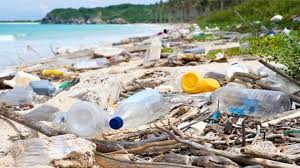Plastic waste is evil, INEOS calls for zero tolerance policies
By Charles Ogallo
Plastics are fundamental to modern life but plastic
waste is an issue in sharp focus like never before, according to INEOS, one of
the World largest chemicals producers , as it calls on governments globally to
adopt zero tolerance policies against littering
The company says plastic is valuable just like
glass, metal, and paper but plastic waste becomes evil especially when it is
badly handled adding that giving up om plastic may not ultimately be the
solution to global wastes problems.
Owned by British billionaire chemical
engineer turned financier and industrialist Sir James Arthur Ratcliffe, the
company calls for further innovations on plastic waste recycling
technologies and a global
approach towards solving the global problem,
This comes as reports show oceans chocking with mou
ntains of plastic wastes threatening the entire
marine ecosystem across the world.
Between 60-80 per cent marine pollution
is composed of plastic, according to a report dubbed, Plastics and Shallow Water Coral Reefs, presented at the Fourth UN Environment
Assembly held early last year in Nairobi..
The report spotlights
the current science on the impact of plastics on shallow water coral reefs and
provides recommendations for policy-makers for addressing and reducing these
impacts which include unprecedented levels of decline in reef health and coral
cover across the globe.
The report indicates that hundreds of millions of
people and industries worth billions of dollars depend on healthy shallow water
coral reefs. Yet, these fragile ecosystems face threat from human activity,
including climate change and pollution.
Plastic waste pollution has always come into sharp
focus during UN Environment meetings with environment experts calling for
sustainable global solutions,
According to head of UN Environment’s coral reef
unit, Jerker Tamelander “Marine plastic litter pollution is already affecting
more than 800 marine species through ingestion, entanglement and habitat
change,”
“Waste continues to leak from land, and coral reefs
are on the receiving end. They also trap a lot of fishing gear as well as
plastic lost from aquaculture. With the impacts of climate change on coral reef
ecosystems already significant, the additional threat of plastics must be taken
seriously.” says Jerker Tamelander
However, INEOS insists that Plastic has changed the
world like no other material and is fundamental to everyday life and that
giving up on it would not be the answer. What’s needed is a wave of
change.
“We believe it is not about saying no to plastic
but saying no to throwing away plastic.We also need to talk about how that
rubbish ended up in those rivers, on beaches, and in the ocean and what we can
do about it” the company says in an articular published in it's website.
Water bottles are seen as a major nuisance for the
environment across the world with many littering rivers, the Indian Ocean,
forests and even drainage.
Kenya's ban on Plastic
Kenya government declared a ban on plastic bags in
2018 as part of her spirited fight against plastic waste pollution in the
country.
President Uhuru Kenyatta recently announced also a
ban on single-use plastics in beaches, national parks, forests and conservation
areas across the country.
According to the President , the ban will take
effect on June 5, 2020. Therefore no
Kenyan going to the beach or national parks while
carrying water bottles, plastic plates, plastic cups as well as plastic spoons
and forks will face arrest immediately the ban comes into force.
The writer's contacts:
kogallo2030@gmail.com
kogallo2030@gmail.com
+254-720504864
@OgalloCharles
.


Comments